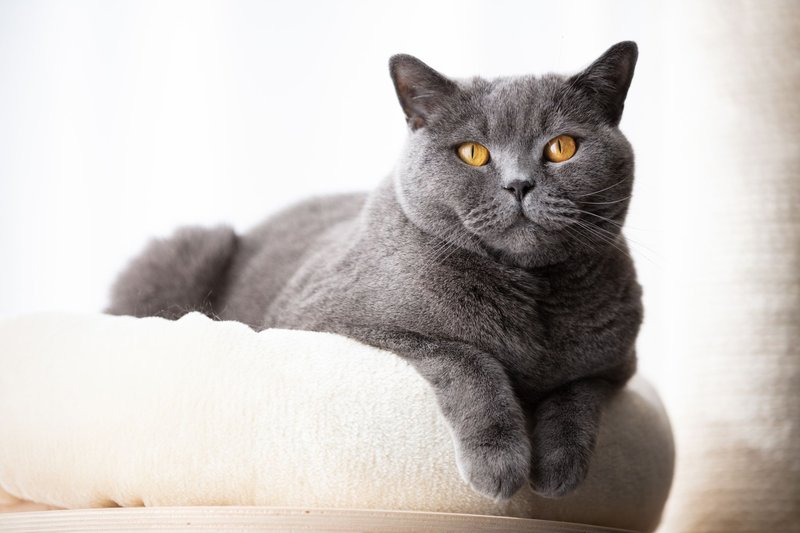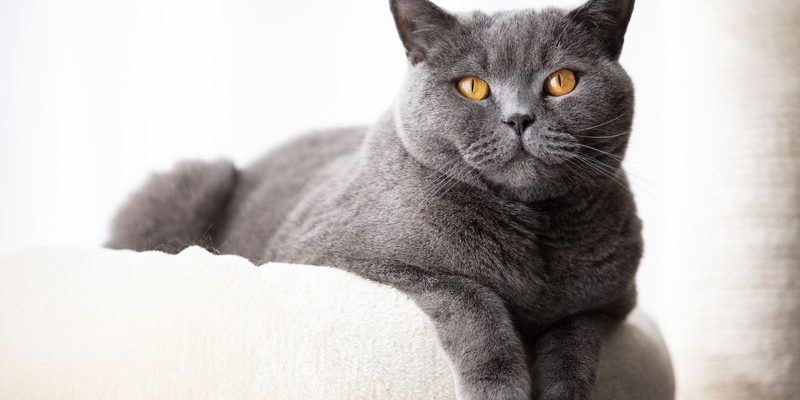
So, what’s the scoop on the British Shorthair? They’re not just cute faces; they come with a rich history and a personality to match. Think of these cats as the gentle giants of the feline world. They have a calm demeanor and a reputation for being easygoing, but they also have their moments of playful mischief, keeping their human friends on their toes. Let’s dig into what makes these cats tick, how they look, and what it takes to give them the care they need.
Physical Appearance of the British Shorthair
The British Shorthair is truly a sight to behold. With their chubby cheeks and stocky build, these cats are the poster child for feline strength and cuteness. Their bodies are muscular and compact, giving them a sturdy look that’s balanced by their short, plush fur. This breed is well-known for its round face and large, expressive eyes, which can come in a variety of colors, including copper and blue.
Their coat is another standout feature. It’s thick and dense, almost like a teddy bear, inviting you to pet and cuddle them endlessly. The classic blue-gray color is iconic, but British Shorthairs come in many colors and patterns, including tabby and tortoiseshell. This variety adds to their charm, making it easy for potential cat owners to find a color scheme they love.
Overall, the breed’s appearance is not just about looks: it reflects their gentle personality. Their soft, rounded features give off a vibe that says, “I’m friendly and approachable!” Just picture a British Shorthair lounging gracefully on your couch, with that adorable round face turned toward you, and you’ll see why so many people fall in love with them.
Personality Traits of the British Shorthair
When it comes to personality, British Shorthairs are known for being incredibly friendly and relaxed. Think of them as the easygoing friends in your life—always there when you need them, but not overly demanding. They enjoy being around people but are not as clingy as some other breeds. You might find them content to sit beside you while you work or watch television, never making a fuss while still wanting to be part of the action.
One of their most admirable traits is their independence. British Shorthairs don’t need constant attention to be happy. This makes them great for busy individuals or families. You might be wondering if they get lonely when left alone. In most cases, they handle alone time quite well, but having toys and a cozy spot to relax can make their day a little more fun.
However, they do have their playful side. Despite their calm nature, British Shorthairs can unleash their inner kitten at times. They love to play with feather toys or engage in a good game of chase. This playful energy is often a wonderful way to keep your cat mentally stimulated and physically fit.
Care Needs of British Shorthair Cats
Caring for a British Shorthair is relatively straightforward, but there are some important aspects to keep in mind. Their coat, while low maintenance compared to long-haired breeds, still needs regular grooming. Brushing them once a week can help remove loose fur and reduce shedding. This is especially useful during seasonal changes when they shed more than usual.
Feeding is another key area to consider. British Shorthairs are prone to weight gain, so choosing a high-quality, balanced diet is crucial. Look for food that’s specifically formulated for indoor cats, as it’s usually lower in calories while still providing the nutrients they need. You might find it helpful to monitor their food intake and offer portion-controlled meals to keep them healthy and happy.
Regular vet check-ups are also important for these cats. Routine vaccinations and dental care will help ensure they live long, healthy lives. You should also keep an eye on their weight and activity levels, as obesity can lead to a range of health problems later on.
Exercise and Playtime for British Shorthairs
Even though British Shorthairs are relatively low-energy cats, they still need regular exercise to stay healthy. Think of exercise like this: it’s not just about keeping fit; it also provides mental stimulation. Engaging them in playtime with toys or interactive games encourages physical activity without overwhelming them.
You might want to invest in a few cat toys that stimulate their natural hunting instincts. Feather wands, laser pointers, or small, soft balls can keep them entertained for hours. Just remember to play in short bursts—about 10 to 15 minutes at a time—so they don’t get overtired.
Additionally, consider providing scratching posts or climbing towers. These elements not only give them a place to scratch but also encourage climbing and jumping, which can help tone their muscles.
Common Health Issues in British Shorthairs
Like any breed, British Shorthairs have specific health issues to watch out for. One common concern is hypertrophic cardiomyopathy (HCM), a hereditary condition that affects heart muscles. Regular vet visits and checking for signs of lethargy or difficulty breathing can help catch potential problems early.
Another issue is obesity, which we touched on earlier. It’s crucial to manage their diet and activity level to prevent excessive weight gain. You might notice that your British Shorthair loves food, so sticking to a feeding schedule can help curb their appetite.
Also, pay attention to their dental health. British Shorthairs can be prone to dental disease, so regular brushing or dental treats can make a big difference. Keeping an eye on their teeth can help avoid more serious health issues down the line.
Welcoming a British Shorthair into Your Home
If you’re thinking about adding a British Shorthair to your family, it’s essential to create a warm and welcoming environment. These cats adapt well to various living situations, whether an apartment or a house. However, make sure to provide them with cozy spots to nap and hide. They love to feel safe and secure, just like anyone else.
When you first bring your new furry friend home, give them some time to adjust. They may be shy or hide initially, but this is normal. Give them space and let them explore at their own pace. You might be surprised how quickly they come out of their shell once they feel safe and comfortable.
Lastly, consider adopting from a reputable shelter or breeder. This helps provide a loving home to a cat in need and ensures you’re getting a healthy pet with a good temperament.
In conclusion, British Shorthairs are delightful companions known for their striking looks and gentle personalities. They’re easy to care for, offering plenty of love without a lot of fuss. If you are ready to welcome one into your home, you’re likely to find a loyal friend who will make every day just a little cozier.

